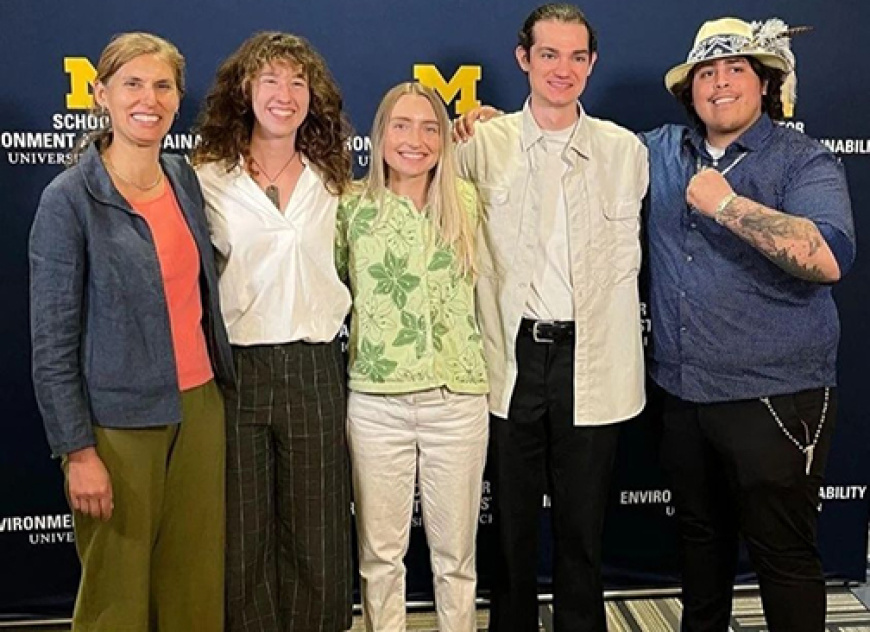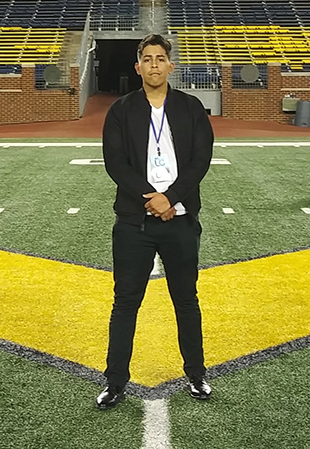
 back to all news
back to all news
Meet the future of Ecosystem Science and Management: Vincent Salgado (MS ’23)

Vincent Salgado (BS ’22, MS ’23)—who was born and raised in the Inland Empire—first came to the University of Michigan as an undergrad interested in studying PPE (politics, philosophy and economics). He soon realized that he wanted to use those interests to help the environment and communities, so he switched to the Program in the Environment (PitE), the undergraduate program overseen by U-M’s School for Environment and Sustainability (SEAS) and the College of Literature, Science and the Arts.
After graduating from PitE, Salgado decided to pursue a master’s degree to “better understand how complex socio-cultural ecosystems work.”
He chose SEAS because of its interdisciplinary curriculum, where he “was able to take a greater variety of courses that greatly expanded my understanding of what I learned as an undergrad.”
Now, Salgado is poised to graduate from SEAS, where he specialized in Ecosystem Science and Management, Environmental Justice, and Behavior, Education and Communication. Salgado’s particular interests center on promoting sovereignty and helping communities build their resilience and self-reliance.
 “A big driver for me is helping communities ensure that when times get hard—like they did during the Covid pandemic when supply chains got shocked—they still have food to eat, water to drink and can get things done on their own. Otherwise, they’ll be in big trouble if abandoned, or, even worse, if our ‘leaders’ start weaponizing aid,” Salgado said.
“A big driver for me is helping communities ensure that when times get hard—like they did during the Covid pandemic when supply chains got shocked—they still have food to eat, water to drink and can get things done on their own. Otherwise, they’ll be in big trouble if abandoned, or, even worse, if our ‘leaders’ start weaponizing aid,” Salgado said.
A highlight of Salgado’s time at SEAS was his master’s project, which included working with the Southeastern Michigan Land Conservancy to develop a prescribed burn program. The project involved looking into the history, culture and philosophy of the Anishinaabeg to understand how to engage and collaborate with tribal partners. Additionally, Salgado investigated how Traditional Knowledges and Western science can collaborate with one another to promote a more equitable vision of sustainability.
“One thing that’s particularly interesting in Traditional Knowledges is that they emphasize the importance of culture and spirituality,” Salgado said. “And they emphasize that if the human connection to the land is not restored, you’re not going to have sustainability. They also emphasize that you must restore direct relations with neighboring entities, whether it’s land, animals, plants, water or rocks, in order for them to persist. All beings have a purpose to share in order to continue the existence of life. We just have to be willing to learn and embrace them.”
This Indigenous philosophy is known as kincentrism, which Salgado said is a much more holistic viewpoint of human relations with Earth and our kin. It’s a philosophy he hopes to bring into his future resiliency work. After taking a break back home in California, Salgado hopes to be able to return to SEAS to pursue a doctorate in Resource Policy and Behavior.
If there’s any advice Salgado would offer students, it’s to take time to connect the dots about how classes relate to one another, especially since SEAS is known for its interdisciplinarity. “It’s a key thing I wish I had been told early on,” Salgado said. “Oftentimes, we like to think of each class as distinct, and we don’t really sit down and think about how what we learned in this class connects with what we learned in another class. And, surprisingly, there could be a lot of overlap, and they often build upon each other.”
Another suggestion is for students to make an effort to “create community” at SEAS. Salgado said he has made great friends at U-M, and it was because he was willing to put himself out there. “Introduce yourself, get to know people, check up on them, let them know you appreciate their presence,” he said. “Yes, everyone is busy with their classes, master’s projects and jobs, but if you stay in your own little world, SEAS will feel like an isolated place.”

